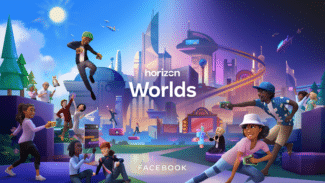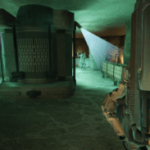Facebook removed its brand from in-development social VR platform Horizon and plans to focus the effort around VR-based building tools with a $10 million fund to encourage creators.
Horizon Worlds is the new name for Facebook Horizon and the company is removing support for Unity-based worlds, encouraging creators building with that game engine to seek release on the Oculus Store.
When the social service was first showcased for Oculus Quest in late 2019 it supported worlds made in Unity which were noticeably more complex and engaging than those made in VR using Facebook’s tools. Unity is the most popular game engine among developers and, alongside Roblox, Rec Room and Epic Games, the companies are on a short list of efforts to build powerful yet easy-to-use tools for interactive 3D virtual world creation. Facebook tried to acquire Unity in the past and the acquisition would’ve given the advertising giant a key toolset that would push many creators to work with the social media company. Instead of selling, though, Unity went public on the stock market in late 2020.
“We don’t have any plans [for] direct Unity-level development on top of Worlds, but absolutely as a VR developer you can build on top of Unity and bring that experience, whether its a game or something else, over to Oculus through the Oculus app store,” said Vivek Sharma, VP of Horizon at Facebook Reality Labs.
Facebook recently announced its Horizon Workrooms app for working remotely in VR. When viewed together, “Horizon” may now be viewed as Facebook’s brand for first party social VR applications.
VR Scripting And Art Creation
Facebook offered a tour of some of the worlds in Horizon made recently by community members using VR-based tools.
Community members are able to add to each other’s work, building up from primitive shapes to make new objects and adding logic and rules to the world via a scripting system. You can of course resize yourself to work at different scales — one of the hallmarks of VR as a medium — so you can make yourself very small to work on tiny details or very large to get an overview of everything. Creators can also install portals to other worlds and share pieces with others to take and build on. For example, a pair of worlds made by OcuLos410 called “Intro To Horizon” and “Horizon World Tours” give creators an overview of what’s possible, a meeting space to get help, and examples of tools they can use to make their worlds more complex.
Overall, then, two years after its initial launch Facebook is honing Horizon Worlds around its VR-based creative community with the $10 million creator fund to be doled out through community competitions, an accelerator program, and funding for developers who agree to build for Horizon according to Facebook’s suggested theme.
Facebook said it would add more people to the testing release of Horizon Worlds throughout the rest of 2021.
“We fully expect ticketed events, we fully expect people to be asking for gifting of goods, trading of goods, buying digital goods and items, as well as of course experiences themselves, so subscriptions inside of these experiences themselves,” said Sharma. “I having nothing to announce today in terms of exact features that we’re working on, but if you take a look at what the family of apps at Facebook already support, it’s a pretty good line that we already have the capabilities other places that we can tie all of these things together into a nice bow for our creators.”





